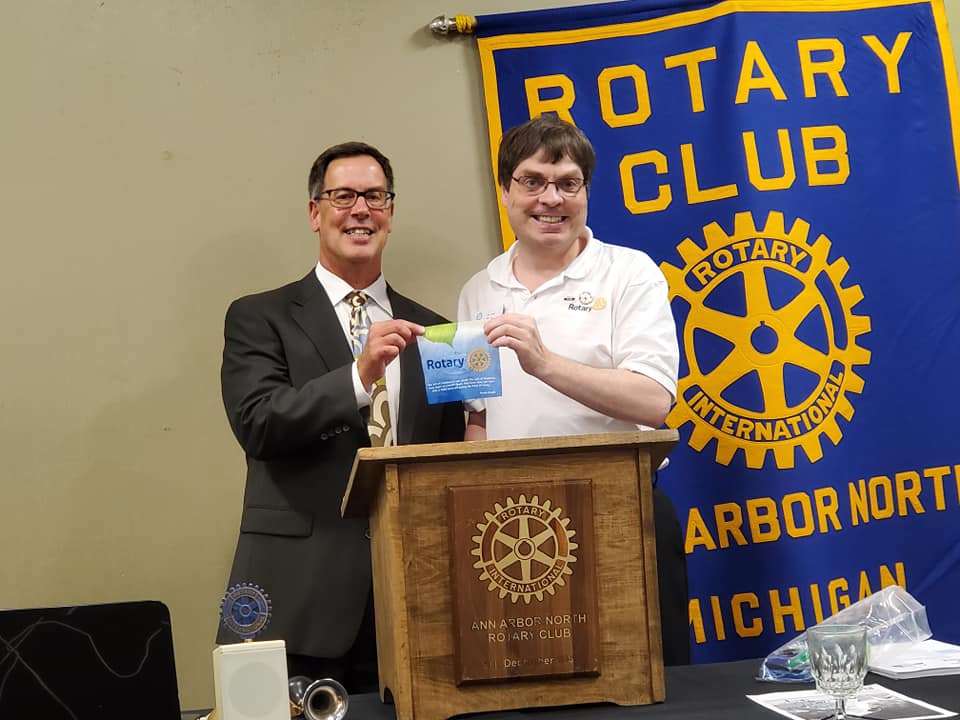Joyce Williams who works at the Kidney Foundation that works heavily with Tim introduced him at the Luncheon.
Gift of Life Michigan, headquartered in Ann Arbor, is the state's only federally designated organ and tissue recovery program, providing all services necessary for organ donation to occur in Michigan.
Gift of Life was incorporated in 1971 by Michigan transplant surgeons to provide a network for sharing kidneys. Today, Gift of Life recovers more than 900 organs every year for transplantation from 300 or more donors, saving hundreds of lives. Bone, skin and other tissue also is recovered, helping to significantly improve the lives of thousands of seriously injured and sick recipients.
In addition, Tim said, "Gift of Life maintains and grows the Michigan Organ Donor Registry in partnership with the Michigan Secretary of State. The registry is a confidential database of people who have expressed their desire to someday help others by becoming an organ, eye and tissue donor."
Gift of Life was incorporated in 1971 by Michigan transplant surgeons to provide a network for sharing kidneys. Today, Gift of Life recovers more than 900 organs every year for transplantation from 300 or more donors, saving hundreds of lives. Bone, skin and other tissue also is recovered, helping to significantly improve the lives of thousands of seriously injured and sick recipients.
In addition, Tim said, "Gift of Life maintains and grows the Michigan Organ Donor Registry in partnership with the Michigan Secretary of State. The registry is a confidential database of people who have expressed their desire to someday help others by becoming an organ, eye and tissue donor."
Some questions Tim addressed during his talk was
- Will doctors work as hard to save my life if they know I’m a donor? Yes, absolutely. When a patient arrives at the hospital, the number one priority is to save his or her life. Doctors and other medical personnel have both a moral and legal obligation to give their patients the best care possible. Organ donation is not considered or even discussed until every effort to save the patient’s life has been tried and, unfortunately, failed.
- I have health problems. Can I still be a donor? Yes, anyone is a potential organ donor despite medical conditions, so please don't rule yourself out! Medical criteria for organ donation changes as medical advances occur, and a physician evaluates all potential donors at the time of death to determine what can be used to help others. We therefore encourage anyone, regardless of their medical history.
- Am I too old to sign up? No, there are no age limits to register. There have been many successful transplants from donors over the age of 50. According to organdonor.gov, one of the oldest organ donors in the U.S. was 92, and his donated liver saved the life of a 69-year-old woman! Don’t rule yourself out because of age.
- Will I still be able to have an open casket at the funeral? Yes, donors are afforded the utmost respect and care, and neither organ nor tissue donation interfere with open casket viewings.
- Why is it important to register as a donor? Your gift will be used to help others through transplantation, therapy, research and education.One person can donate up to eight life-saving organs, as well as tissues and corneas. Donated tissue can help up to 75 people, and be used to repair wounds, burns, and joints. Donated corneas can restore vision, or relieve painful swelling.Organs and tissue that cannot be transplanted are valuable to research and education, allowing surgical teams to practice their transplant skills or contribute to research projects. For example, islet cells recovered from a donated pancreas could help researchers trying to find a cure for diabetes. Registering as a donor is therefore an important step for anyone who wishes to help others through the gift of organ and tissue donation. If you register to become a donor, you relieve your grieving family of having to make a decision when you die. Having your wishes documented also ensures that your decision to donate will be carried out, if medically possible.
- Why should I donate? More than 3,000 people are on the waiting list for a life-saving organ transplant in Michigan, with more than 113,000 on the national waiting list. People die waiting every single day because the number in need of transplants greatly outpaces the number of organs available. There is an especially critical need for hearts, livers and kidneys.
After the Luncheon our special guest today District Governor Don (Sparky) Leonard took the club out side to show off "Spark Plug".

